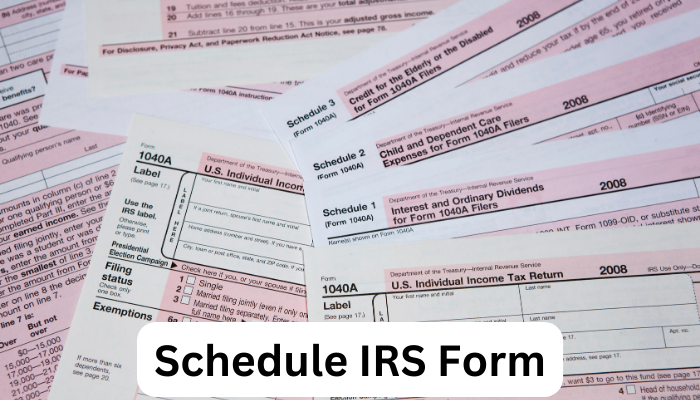
Is Tax Preparation Deductible?
The distressing times of tax season can be quite entangling for individuals and businesses alike. In such times, it is natural to wonder about ‘Is tax preparation deductible?’ or ‘Can I deduct the cost of tax preparation?’ because navigating through these complicated regulations isn’t as easy as learning ABC.
Through the years 2018 to 2025, only the self-employed are able to claim a deduction for tax preparation. It implies the fact that if you own a business as a sole proprietor, you are automatically eligible for this deduction. This can be claimed on Schedule C (Form 1040) issued by the Internal Revenue Service (IRS).
What is a Schedule on an IRS Form?
A taxation schedule is a form that the IRS demands from taxpayers to prepare anything added with the filed tax return preparation in case they have side or additional sources of income or deductions, which commonly includes significant amounts of interest income, mortgage interest, or charitable funds, also known as contributions.

Other than self-employed persons, those who can deduct tax fees include tax software or working with a professional. You have to fit the following criteria to be eligible for this deduction:
- A sole proprietor or independent contractor who files a Schedule C with your return
- A farmer who files Schedule F
- A landlord who earns income from rental properties and files Schedule E
- An individual who earns income from royalties and files a Schedule E
However, it is important to note that you may not be allowed to deduct the entire amount. Only that amount claimable that was accrued by preparing the business portion of your taxes. The rest falls in the category of personal expenses, such as personal deductions, standard deductions, and credits.
Is Tax Preparation Deductible – What Portion Can be Deducted?
Now you’ve got the answer to the question, ‘Is tax preparation deductible or not, the next obstacle to understanding the extent of the portion that you can deduct. Under normal circumstances, the IRS covers the following expenses:
- Fees from a tax preparer or an accountant. It includes the actual cost of the return preparation as well as both the meetings.
- Price of tax preparation software programs
- Fees for e-filing, which also include credit card fees.
Are Statutory Employees Eligible for Tax Deductions?
Statutory employees are independent contractors who are treated as employees by statutes to fulfill the purpose of tax withholdings. According to Schedule C of the IRS, the following such workers are eligible for tax deduction:
- Sales agents of life insurance
- Individuals work remotely from their residences only when the employer or hiring manager dictates and assigns the tasks along with ensuring the provision of supplies.
- A full-time traveling or local salesperson only if this is their primary source of income.
- Drivers who earn on a daily commission basis and distribute certain foods, products, and drinks or beverages, excluding milk.
- Daily wage earner who receives orders from the dispatchers and delivers them to their destination; these include only dry cleaning or laundry-related items.
How to Claim a Deduction for Tax Preparation Fee?
Being ordinary yet necessary for your business to run smoothly, tax preparation fees are deductible only on schedules C, E, and F.
1. Claim Through Schedule C
On Schedule C of the IRS, these fees are considered professional and legitimate. While going through the details of this form on the official website of the IRS, you’ll see that it’s Line 17 in the second part of the schedule, which is labeled as ‘Expenses.’ Moreover, they can include anything that you might have to spend to resolve a taxation issue or dispute with the IRS with respect to the profit or loss of your business.
2. Claim Through Schedule E
If you’re wondering about ‘Are estate planning fees tax deductible or not?’, know that schedule E is designed for it.
Supplemental Income and Loss can be claimed via Schedule E, which provides coverage over a wide variety of situations and entities relevant to tax. It provides coverage for a wide variety of situations and entities related to tax and includes income from renting out real estate or collecting royalties. However, it is a second reminder that not the entire tax preparation cost is subject to deduction.
Is HOA tax deductible or not, depending if your property is used for rental purposes? In such a case, the IRS considers HOA fees to be deductible as an expense for rent.
3. Claim Through Schedule F
Schedule F is for Profit or Loss from Farming. On this form, the fee for tax preparation falls into the category of ‘other expenses,’ which appears on Line 32. It is demanded by the taxpayers to break down what these expenses were for on the lettered lines.
What expense is not tax deductible?
Tax regulations vary by jurisdiction; however, certain expenses typically aren’t tax-deductible; personal living expenses like groceries and clothing tend not to count toward tax deductions.
Government penalties tend to be non-deductible; this includes fines imposed for traffic offences, late payment fees, and similar charges.
Political contributions made directly to candidates or political parties generally do not qualify as tax-deductible items, while charitable donations to qualified organizations do.
Finally, expenses or income generated from illegal activities or income obtained illegally cannot be deducted for tax purposes, including fines or legal fees associated with engaging in illicit acts.Consulting a tax professional or consulting local regulations regarding tax deduction and non-deduction rules and limitations can be essential when understanding which expenses qualify as deductions in your particular circumstance.
Conclusion
Summarizing this entire discussion on ‘Is tax preparation deductible?’, it is essential to keep complete documentation of the, thorough documentation to substantiate the deductions during the IRS audits. Please note that there are certain ‘schedules’ issued from the IRS to be fulfilled with respect to the services you’re looking forward to avail of or the responsibilities that you must fulfill before the arrival of the deadline.


